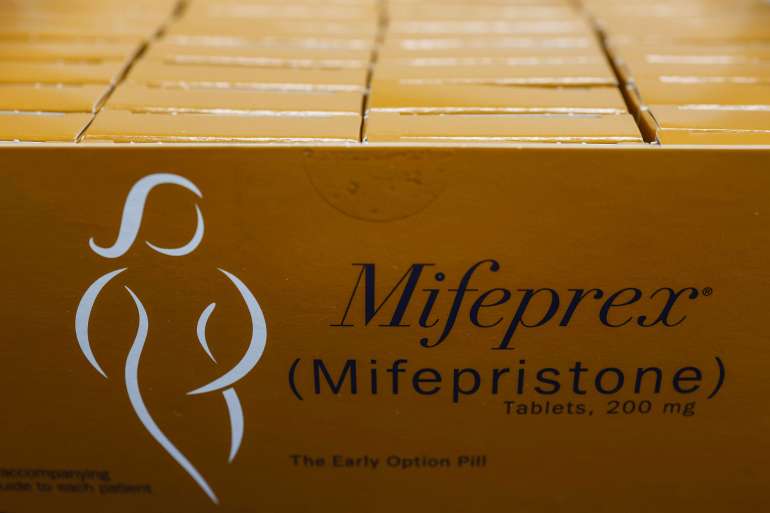Lawyers suggest a way around abortion pill restrictions but doctors may be afraid to try it

Threats of prosecution, harassment, retaliation from state licensing boards and civil litigation could do as much as any judge’s opinion to keep doctors on the sidelines.
The U.S. 5th Circuit Court of Appeals is set to hear arguments on May 17 from anti-abortion medical groups that are seeking to overturn FDA approval of the pills and functionally ban their use nationwide, as well as counterarguments from the Biden administration and pharmaceutical company Danco which want current regulations on the drug upheld.
The 5th Circuit previously ruled to keep mifepristone on the market but impose sweeping restrictions that included banning telemedicine prescriptions, mail delivery and pharmacy dispensing of the pill and blocking the sale of the generic version, which is used in about two-thirds of medication abortions. Should the judges hearing the case rule in favor of those restrictions, the window of time patients would be approved by the FDA to take mifepristone would shrink from 10 to seven weeks of gestation — cutting off access before many know they are pregnant.
The gestational limit could be one of the simplest pieces of the court order for doctors to sidestep — easier, for example, than the requirement that patients make three in-person visits in order to obtain the drug, said David S. Cohen, a professor at Drexel University who specializes in abortion law.
“There’s nothing illegal about prescribing off-label,” he stressed. “It’s a regular part of medical practice. Going after off-label use would undermine the entire medical system.”
Yet providers fear that anti-abortion advocacy groups or conservative state officials — who have already threatened pharmacies and other entities with lawsuits related to the dispensing of abortion pills — could target them for off-label prescriptions. Among their concerns: malpractice claims or challenges to their medical licenses.
“Even if it’s something that we think is legal, that we’ve discussed with lawyers, and we’ve been reassured that it’s legal, we still don’t necessarily want to risk our whole practice and our license on the off chance that things go sour,” said Kristyn Brandi, a practicing OBGYN who chairs the board of Physicians for Reproductive Health. “Unfortunately, as an abortion provider, I’ve always had to look over my shoulder when I give care. So even though there may be lots of protections for providers, there will still be a chilling effect for getting medication off-label.”
Some prominent Democratic lawmakers and advocacy groups have urged President Joe Biden to defy any court ruling that restricts access to the pills and use executive powers to protect the drugs’ availability. But even an explicit federal declaration of non-enforcement — a strategy the White House has refused to entertain — would not necessarily help physicians.
The FDA’s enforcement powers only cover the companies that make and distribute drugs — not the doctors who prescribe them. And while only a handful of states mandate that doctors abide by official FDA guidelines for abortion pills, most of those states’ laws have been superseded in the past year by near-total bans on abortion, rendering them functionally moot.
“We don’t feel at all comfortable,” Resneck said. “Off-label prescribing is common, but it is really unclear in this case what physicians would be able to do.”
The risk doctors run could vary state-to-state.
A separate federal court ruling out of Washington may shield 17 states and D.C. from any attempts to impose federal restrictions on mifepristone. And while several progressive states — including California, Massachusetts, New York and New Jersey — did not sign onto that lawsuit, their leaders support abortion rights and are unlikely to target providers who prescribe the pill off-label.
“I don’t see any reason why providers in those states would be at risk,” said Greer Donley, a law professor at the University of Pittsburgh’s Center for Bioethics and Health Law. “But if you have a state like Kansas where abortion is legal but you have very conservative and motivated anti-abortion actors — like the attorney general — that’s a different situation. They could already be combing through their state regulations to see what they could try to do.”
Whether doctors will continue to prescribe abortion pills off label in the months ahead carries high stakes.
Mifepristone is only approved by the FDA for abortion, though it’s commonly prescribed by doctors off label for managing a miscarriage. It’s also been used for decades in combination with misoprostol — a drug officially approved to treat stomach ulcers but commonly prescribed off-label to terminate a pregnancy.
If courts impose a seven-week cutoff for mifepristone that doctors fear overstepping, it would also limit one of the most-used windows in which patients take the drug.
While data on exactly what point in pregnancy people take the pills is incomplete because not all states or providers share information with the federal government, the CDC’s most recent data shows that 35.6 percent of all abortions take place between weeks seven and nine of pregnancy. That’s less than the roughly 45 percent of abortions that take place before six weeks, but a group that still included more than 166,000 patients in 2020. And over 12 percent, or nearly 60,000 people, ended their pregnancies between 10 and 13 weeks of gestation.
“It would definitely impact patients if they have to bring that gestational age limit down,” Brandi said. “Most patients don’t know that they’re pregnant until around this time — somewhere between six and 10 weeks.”